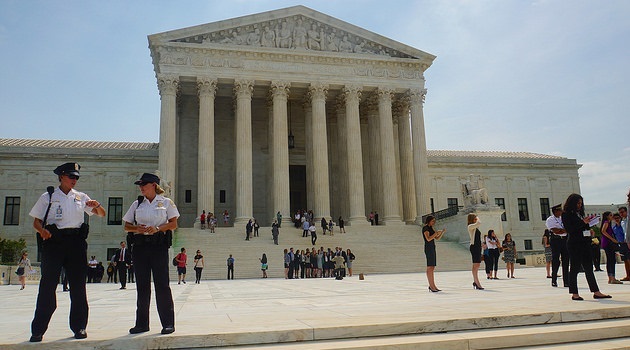On the rare occasions when I write about the Supreme Court, it’s usually to grouse that the Justices don’t defend the Constitution’s limits on the federal government.
For example, the Court engaged in tortured reasoning to rule in favor of Obamacare even though there’s nothing in Article 1, Section 8, that gives Washington the power to mandate the purchase of health insurance (though that awful decision by Chief Justice John Roberts looks brilliant compared to the even-worse 1942 decision that gave Washington the power to control whether a farmer could grow grain on his own farm to feed his own hogs).
But perhaps the Supreme Court can make up for some past mistakes by accepting – and then properly deciding – a case from New Hampshire.
The Granite State wants to block the government of Massachusetts from imposing taxes on people who live and work in New Hampshire.
For some background on this legal battle, the Wall Street Journal has a new editorial on this topic.
Can a state collect income tax from nonresidents working remotely for in-state businesses? Massachusetts, New York and some other states claim they can, and now New Hampshire is asking the Supreme Court to protect its citizens from this tax grab. …New Hampshire, which imposes no income tax on wages, last fall sued Massachusetts and is asking the Supreme Court to hear its case (N.H. v. Mass.). “Massachusetts has unilaterally imposed an income tax within New Hampshire that New Hampshire, in its sovereign discretion, has deliberately chosen not to impose,” says the Granite State. Under longstanding Supreme Court precedent, states can only collect taxes that are “fairly apportioned” and “fairly related to the services provided by the State” within their borders. …Massachusetts and other states are forcing nonresidents to pay income taxes even though they don’t use public services. …If the Court doesn’t intervene, remote workers who are unfairly taxed by other states will have no recourse for redress beyond biased state tax tribunals. States like California may copy the Massachusetts and New York playbook.
Jeff Jacoby, a columnist for the Boston Globe, argues his state is one the wrong side of this fight.
In April, the Department of Revenue published an “emergency regulation” declaring that any income earned by a nonresident who used to work in Massachusetts but was now telecommuting from out of state “will continue to be treated as Massachusetts source income subject to personal income tax.” For the first time ever, Massachusetts was claiming the authority to tax income earned by persons who neither lived nor worked in Massachusetts. …Massachusetts has indeed injured New Hampshire… It has launched what amounts to an attack on a fundamental aspect of New Hampshire’s sovereign identity — its principled refusal to tax the income of New Hampshire residents earned in New Hampshire. It was one thing for Massachusetts to withhold taxes from New Hampshire residents for income earned within the borders of Massachusetts. With its new tax rule, however, Massachusetts is reaching over the border to extract taxes, thereby undermining a core New Hampshire policy. …the Supreme Court has the power to shut down such overreaching. And now, thanks to New Hampshire, it has the opportunity.
Professor Ilya Somin from George Mason University’s law school elaborates in a column for Reason.
New Hampshire v. Massachusetts…has some real merit, and also has important implications for the future of American federalism. …New Hampshire’s motion…in the Supreme Court outlines two theories as to why the Massachusetts rule is unconstitutional: it violates the Dormant Commerce Clause (which prevents states from regulating and taxing economic activity beyond their borders), and the Due Process Clause of the Fourteenth Amendment, which has long been held to bar state taxation of people who neither live nor work within its borders. Both arguments build on one of the bedrock principles of American federalism: that state sovereignty is territorial in nature. States do not have the power to regulate and tax activity beyond their borders. …most of Massachusetts’ arguments rely on the notion that the NH workers in question have close connections to the Massachusetts economy and benefit from interacting with it . Therefore the state claims it has a right to keep taxing them as before. …If Massachusetts prevails…, it could potentially have dire implication for the growing number of people who work as remote employees for firms located in another state. The latter state could tax their income even if they never set foot there. This would also make it much harder for people to “vote with their feet” for states with lower taxes, better public policies, and other advantages. …The “Live Free or Die State” deserves to win this important case.
The above columns mostly focus on the legal aspects of the case.
From my perspective, I’m more concerned about upholding the principle that the economic powers of governments should be constrained by borders.
That’s the reason why I defend so-called tax havens, even when that leads to abuse (government officials engaging in everything from name calling to legal threats). Simply stated, high-tax nations shouldn’t have the right to tax economic activity that occurs inside the borders of low-tax jurisdictions.
After all, if we want to constrain “Goldfish Government,” taxpayers need some ability to escape oppressive tax regimes.
The bottom line is that the Supreme Court should take this opportunity to limit the Bay State’s greedy politicians.
P.S. This case is partly a fight between proponents of territorial taxation (the good guys) and proponents of extraterritorial taxation (the bad guys).
P.P.S. The Supreme Court unfortunately did recently rule on the wrong side of a case involving extraterritorial taxation.
P.P.P.S. If you want a practical example of what this means, read this column about the taxation of successful Olympic athletes.






